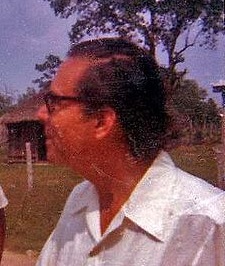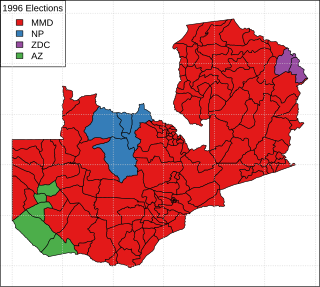
Said Wilbert Musa is a Belizean lawyer and politician. He was the Prime Minister of Belize from 28 August 1998 to 8 February 2008.

George Cadle Price, PC, OCC, was a Belizean statesman who served twice as the head of government of Belize from 1961–1984 and 1989–1993. He served as First Minister and Premier under British rule until independence in 1981 and was the nation's first prime minister after independence that year. He is considered to have been one of the principal architects of Belizean independence. Today he is referred to by many as the "Father of the Nation". Price effectively dominated Belizean politics from the early 1960s until his 1996 retirement from party leadership, serving as the nation's head of government under various titles for most of that period.

The House of Representatives of Belize is one of two chambers of the National Assembly, the other being the Senate. It was created under the 1981 constitution. Members are commonly called "Area Representatives."

General elections were held in Belize on 27 August 1998. The result was a victory for the People's United Party, which won 26 of the 29 seats and Said Musa was elected as Prime Minister for the first time. Voter turnout was 90.1%, the highest since independence.

General elections were held in Belize on 21 November 1979. The result was a victory for the ruling People's United Party, which won 13 of the 18 seats. Voter turnout was 89.9%.

A legislative election was held in British Honduras in December 1969. Citizens elected 18 members to the British Honduras Legislative Assembly for a term of five years.

A legislative election was held in British Honduras on 20 March 1957.

A legislative election was held in Belize on 30 October 1974. Belizeans elected 18 members to the House of Representatives. The election was the first since the country was officially renamed from British Honduras in 1973.

A legislative election was held in British Honduras on 1 March 1965. Belizeans elected 18 members to the British Honduras Legislative Assembly.
Philip Stanley Wilberforce Goldson was a Belizean newspaper editor, activist and politician. He served in the House of Representatives of Belize as member for the Albert constituency from 1965 to 1998 and twice as a minister. Goldson was a founding member of both of Belize's current major political parties, the People's United Party (PUP) in the 1950s and the United Democratic Party (UDP) in the 1970s. He was also the leading spokesman of the hardline anti-Guatemalan territorial claims National Alliance for Belizean Rights party in the 1990s.
The History of Belize dates back thousands of years. The Maya civilization spread into the area of Belize between 1500 BC to 1200 BC and flourished until about 1000 AD. Several Maya ruin sites, including Cahal Pech, Caracol, Lamanai, Lubaantun, Altun Ha, and Xunantunich reflect the advanced civilization and much denser population of that period. The first recorded European settlement was established by shipwrecked English seamen in 1638. Over the next 150 years, more English settlements were established. This period also was marked by piracy, indiscriminate logging, sporadic attacks by natives, and neighboring Spanish settlements.

General elections were held in Zambia on 18 November 1996 to elect a President and National Assembly. They were boycotted by the main opposition party, the United National Independence Party, together with five other allied parties, following changes to the constitution which they failed to have reversed following a court challenge. The changes imposed a two-term limit on the presidency, required presidential candidates to be born to two Zambian citizens by birth or descent, and required National Assembly candidates to give up their chieftaincy. UNIP believed these changes were specifically aimed at their longtime leader, Kenneth Kaunda, whose parents were Malawian and had previously served as the country's first president from 1964 to 1991. The changes would have also excluded UNIP's vice president, a chief. Subsequently, the ruling Movement for Multi-Party Democracy won a comfortable victory in both elections, taking 131 of the 150 elected seats in the National Assembly, and its candidate, Frederick Chiluba, winning 73% of the vote in the presidential election.

A legislative election was held in Belize on 7 March 2012 to elect all 31 members of the Belize House of Representatives as well as offices in the various local governments. The election was run by the Elections and Boundaries Commission's Elections and Boundaries Department. Dean Barrow and his United Democratic Party (UDP) were re-elected, but lost eight seats to the opposition People's United Party (PUP) to maintain a slim 17-14 majority in the Belize House. The upper house of the Belize National Assembly, the Senate, was appointed after the election by the UDP-led government in accordance with the Constitution of Belize.

General elections were held in Belize on 4 November 2015 to elect members of the House of Representatives. On 28 September 2015 Prime Minister Dean Barrow announced that he had advised the Governor-General to dissolve the National Assembly and to fix Wednesday 4 November 2015 as the date for the next general elections.

The next Belizean general election will elect members of the country's House of Representatives. It must be held on or before 13 February 2021.










